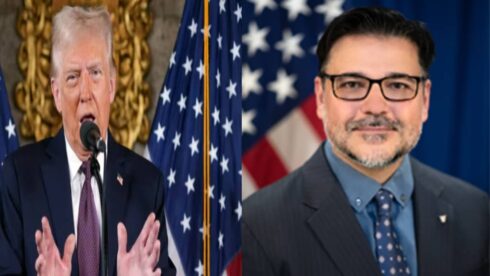President Donald Trump has reassigned Caleb Vitello, the acting director of U.S. Immigration and Customs Enforcement (ICE), due to dissatisfaction with the current rate of arrests and deportations of undocumented immigrants. This move underscores the administration’s intensified focus on accelerating immigration enforcement efforts. Caleb Vitello, a 23-year veteran of ICE, was appointed as acting director in December 2024. Despite his extensive experience, the Trump administration expressed frustration over the agency’s performance, particularly the slower-than-anticipated pace of deportations. As a result, Vitello has been reassigned to oversee all field and enforcement operations, focusing on locating, arresting, and deporting illegal aliens—a priority emphasized by both President Donald Trump and Homeland Security Secretary Kristi Noem.
This leadership change follows the recent reassignment of two other senior ICE officials, Russell Hott and Peter Berg, who were moved to field offices in Washington, D.C., and St. Paul, Minnesota, respectively. These decisions reflect the administration’s commitment to instilling a culture of accountability within ICE to meet its immigration enforcement objectives.
Discrepancy Between Expectations and Performance
The administration’s decision to reassign Vitello was influenced by data indicating that, during President Trump’s first month in office, ICE deported approximately 37,660 individuals. This figure falls short of the 57,000 monthly average during the final year of President Joe Biden’s tenure. The shortfall has been a source of concern for the administration, which has pledged to significantly increase deportation numbers.
White House border czar Tom Homan has also voiced dissatisfaction with the current enforcement metrics, stating, “I’m not satisfied. We got to get more.” This sentiment highlights the administration’s resolve to enhance the effectiveness of ICE operations and fulfill its immigration policy promises.
Operational Challenges and Strategic Adjustments
ICE faces several logistical challenges in scaling up deportation efforts, including a limited number of enforcement officers, detention beds, and transportation resources. To address these constraints, the Trump administration has supplemented ICE’s capabilities with military assets, such as planes, and has redeployed officers from other agencies to support immigration enforcement operations.
Despite these measures, the agency continues to grapple with operational hurdles, including sanctuary city policies and information leaks that impede enforcement actions. These challenges necessitate ongoing strategic adjustments to align ICE’s performance with the administration’s deportation targets.
Implications for ICE Personnel and Future Direction
The reassignment of Vitello and other senior officials signals a clear message to ICE personnel about the administration’s expectations for performance and accountability. A Department of Homeland Security spokesperson emphasized the need for a culture of accountability within ICE, stating that leadership changes are intended to ensure the agency delivers on its mandate.
As the administration prepares to announce a new acting director for ICE, there is an anticipated shift towards more aggressive enforcement strategies. This transition aims to enhance the agency’s capacity to meet the ambitious deportation goals set forth by President Donald Trump.
Broader Context of Immigration Policy
These developments occur within the broader context of the Trump administration’s commitment to stringent immigration policies. The reassignment of top ICE officials reflects a strategic effort to overcome existing challenges and expedite the deportation process. The administration’s actions underscore its dedication to enforcing immigration laws and addressing unauthorized immigration through decisive organizational and operational reforms.














